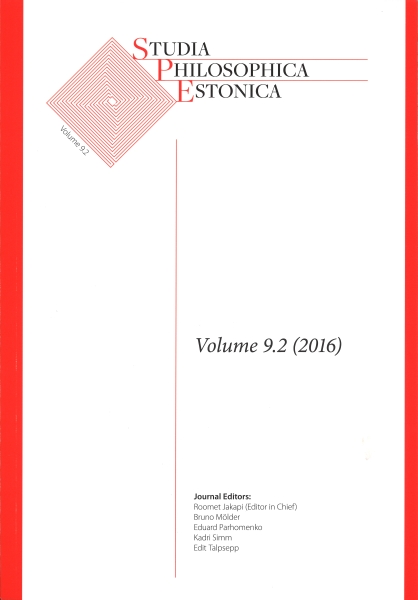Subjekti- ja vabadusekäsituse muutused Jean-Paul Sartre’i fenomenoloogias ja eksistentsialismis
DOI:
https://doi.org/10.12697/spe.2016.9.2.03Keywords:
fenomenoloogia, eksistentsialism, subjektiivsus, subjekt, vabadus, phenomenology, existentialism, subjectivity, subject, freedomAbstract
Artikkel uurib muutusi ja arenguid Jean-Paul Sartre’i subjektikäsituses, mis leidsid aset tema fenomenoloogilise ja eksistentsialistliku mõtlemise perioodidel (kuni 50. aastate lõpuni), keskendudes valdavalt tema filosoofilistele töödele, rõhuasetusega subjekti üldist struktuuri puutuval problemaatikal. Suurimat tähelepanu pälvivad vabadusega seonduvad transformatsioonid, sest selles vallas on Sartre’i seisukohtade erinevused kõige märgatavamad ja ühtlasi kõige olulisemad, kuid jõudumööda pööratakse pilk ka nüansseeritumatele teisendustele. Artikkel tutvustab põgusalt nimetatud muutuste ja nende taga seisvate arengute sisu, püüab Sartre’i mõtlemise perioode klassifitseerida, loob võrdlusi varasemate ja hilisemate teoste vahel ning polemiseerib autoritega, kes modifikatsioonide tähtsust kas alahindavad või sootuks tähelepanuta jätavad. Kokkuvõttes jõutakse tõdemuseni, et paljudel hilisema Sartre’i poolt kasutatavatel mõistetel on varasemaga võrreldes üsna teistsugune tähendus ning need tähendusnihked annavad tunnistust sellest, et Sartre’i subjekti-filosoofias leidsid aset mõned üsna kardinaalsed, eriti just vabadust ja subjekti läbipaistvust puudutavad pöörded.
Tarmo Tirol's article follows the development of Jean-Paul Sartre's theory of subjectivity and freedom in his phenomenological philosophy and in his early and middle period of existentialism. The main concern of this work is to examine noticeable (but also smaller yet significant) changes that took place in the development of Sartre's philosophy with respect to subjectivity, freedom, subject's general structure and its position in the world. Tirol's article studies and classifies the main contents of these modifications, compares Sartre's views in different works, and opposes to those views which claim that Sartre's philosophy did not significantly change. The article concludes that many concepts that Sartre is using later in describing subjectivity and subject's freedom imply some meaning changes compared with their earlier meanings; and this indicates that there were some noticeable shifts in Sartre's understanding, especially concerning subject's freedom and transparency.
References
Anderson, P. and Fraser, R. and Hoare, Q. (2006). Itinerary of a Thought, in P. Anderson, R. Fraser, Q. Hoare and S. Beauvoir, Conversations with Jean-Paul Sartre, Seagull Books, London, New York, Calcutta, pp. 1-66.
Anderson, T. C. (1993). Sartre's Two Ethics: From Authenticity to Integral Humanity, Open Court, La Salle.
Barnes, H. E. (1963). Introduction, in J.-P. Sartre, Search for a Method, Alfred A. Knopf, New York, pp. vii-xxxi.
Barnes, H. E. (1988). Sartre's Concept of the Self, in Robert Wilcocks (Ed), Critical Essays on Jean-Paul Sartre, G. K. Hall & Co, Boston, pp. 137-160.
Beauvoir, S. (1984). Adieux: A Farewell to Sartre, Andre Deutsch Ltd., London.
Busch, T. W. (1990). The Power of Consciousness and the Force of Circumstances in Sartre's Philosophy, Indiana University Press, Bloomington and Indianapolis.
Catalano, J. S. (2010). Reading Sartre, Cambridge University Press, Cambridge.
Coombes, S. (2008). The Early Sartre and Marxism, Peter Lang AG., Bern.
Cumming, R. D. (1991). Phenomenology and Deconstruction. Vol 1: The Dream is Over, The University of Chicago Press, Chicago and London.
Cumming, R. D. (1981). To Understand a Man, in P. A. Schlipp (Ed), The Philosophy of Jean-Paul Sartre, Open Court, La Salle, pp. 55-85.
Detmer, D. (1988). Freedom as a Value: A Critique of the Ethical Theory of Jean-Paul Sartre, Open Court, La Salle.
Dreyfus, H. L. and Hoffman, P. (1981). Sartre's changed conception of consciousness: from lucidity to opacity, in P. A. Schlipp (Ed), The Philosophy of Jean-Paul Sartre, Open Court, La Salle, pp. 229-245.
Elveton, R. (2009). Autobiography, Ontology and Responsibility, in B. O'Donohoe and R. Elveton (Eds), Sartre's Second Century, Cambridge Scholars Publishing, Newcastle upon Tyne, pp. 17-34.
Flynn, T. R. (2014). Sartre: A Philosophical Biography, Cambridge University Press, Cambridge.
Fretz, L. (2006). Individuality in Sartre's philosophy, in C. Howells (Ed), The Cambridge Companion to Sartre, Cambridge University Press, Cambridge, pp. 67-99.
Gerassi, J. (2009). Talking with Sartre: Conversations and Debates, Yale University Press, New Haven and London.
LaCapra, D. (1978). A Preface to Sartre, Cornell University Press, Ithaca, New York.
Meszaros, I. (2012). The Work of Sartre: Search for Freedom and the Challenge of History, Monthly Review Press, New York.
Pucciani, O. F. and Rybalka, M. (1981). An Interview with Jean-Paul Sartre, in P.A. Schilpp (Ed), The Philosophy of Jean-Paul Sartre, Open Court, La Salle, pp. 1-51.
Sheridan, J. F. (1969). Sartre: The Radical Conversion, Ohio University Press, Athens, Ohio.
Sartre, J-P. (1995). Anti-Semite and Jew: An Exploration of the Etiology of Hate, Schocken Books, New York.
Sartre, J-P. (1972). Baudelaire, A New Directions Paperbook, New York.
Sartre, J-P. (2001). Being and Nothingness, Routledge, London.
Sartre, J-P. (1968). The Communists and Peace with A Reply to Claude Lefort. George Braziller, New York.
Sartre, J-P. (2010). Critical Essays, Seagull Books, London, New York, Calcutta.
Sartre, J-P. (2012). The Imagination, Routledge, London and New York.
Sartre, J-P. (1988). Introducing Les Temps modernes, in J-P. Sartre, What Is Literature? and Other Essays, Harvard University Press, Cambridge, Massachusetts, pp. 247-267.
Sartre, J-P. (2002). Iiveldus, Varrak, Tallinn.
Sartre, J-P. (1962). Materialism and Revolution, in J-P. Sartre, Literary and Philosophical Essays, Collier Books, New York, pp. 198-256.
Sartre, J-P. (1992). Notebooks for an Ethics, The University of Chicago Press, Chicago and London.
Sartre, J-P. (2009). Portraits, Seagull Books, London, New York, Calcutta.
Sartre, J-P. (1948). The Psychology of Imagination, Philosophical Library, New York.
Sartre, J-P. (1971). Saint Genet: Actor and Martyr, New American Library, New York.
Sartre, J-P. (1963). Search for a Method, Alfred A. Knopf, New York.
Sartre, J-P. (1976). Situations, X, Gallimard, Paris.
Sartre, J-P. (1962). Sketch for a Theory of Emotions, Methuen, London.
Sartre, J-P. (2006). Sõnad, Varrak, Tallinn.
Sartre, J-P. (2005). The Transcendence of the Ego: A Sketch for a Phenomenological Description, Routledge, London and New York.
Sartre, J-P. (1995). Truth and Existence, The University of Chicago Press, Chicago and London.
Sartre, J-P. (1988). What Is Literature? in J-P. Sartre, What Is Literature? and Other Essays, Harvard University Press, Cambridge, Massachusetts, pp. 21-245.
Sartre, J-P. (1999). War Diaries: Notebooks from a Phoney War 1939-4 Verso, London, New York.
Simont, J. (2006). Sartrean ethics, in C. Howells (Ed), The Cambridge Companion to Sartre, Cambridge University Press, Cambridge, pp. 178-210.





